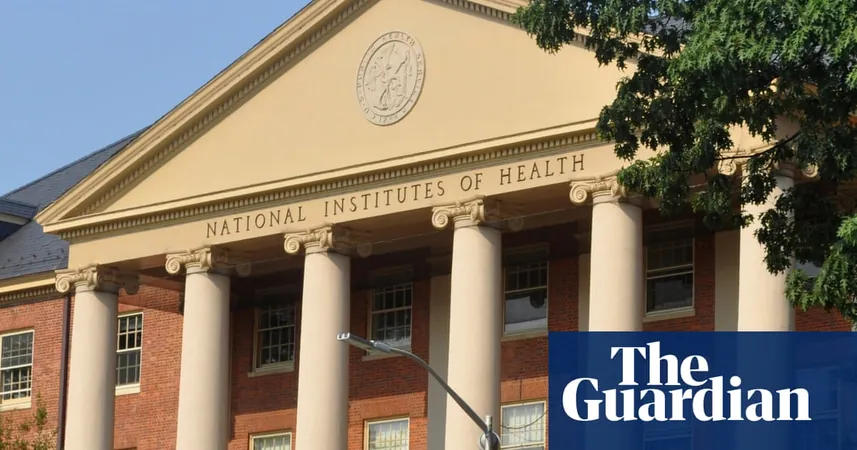
Shockwaves in HIV Research: Trump Era Cuts Threaten Decades of Progress!
2025-03-31
Author: Michael
Overview of Funding Cuts
The federal government has made a sweeping decision that scientists warn could significantly set back advancements in HIV research and care. Recent cancellations of over 300 projects funded by the National Institutes of Health (NIH) have left researchers reeling, especially with 65 of these projects directly tied to critical HIV studies. Many scientists learned about their grant losses just days ago, casting uncertainty on future breakthroughs in combating the epidemic.
Expert Concerns
Julia Marcus, a professor at Harvard Medical School and a recipient of grant terminations, expressed grave concerns: "The loss of this research could very well result in a resurgence of HIV that becomes more generalized in this country. These drastic cuts are quickly dismantling the infrastructure of scientific research in the U.S., potentially losing a generation of scientists."
Impact of PrEP on HIV Prevention
The cuts come at a time when Pfizer and Gilead, among others, have positioned pre-exposure prophylaxis (PrEP) as a game-changer for HIV prevention. This daily antiviral has been approved since 2012 and has proven extraordinarily effective in preventing new infections. However, access to these life-saving medications remains uneven, particularly among demographics that bear the brunt of the epidemic, such as trans women and Black men. Sadly, as many as 30,000 new infections still occur each year in the U.S.
Diversity and Inclusion Studies
Marcus, who was investigating initiatives to make PrEP available over the counter, emphasized that understanding and addressing the needs of the most affected populations is crucial for impactful research. Yet, a recent termination letter obtained by the Guardian highlighted a controversial rationale: the dismissal of "diversity, equity, and inclusion (DEI)" studies, claiming they could lead to discrimination based on race and other protected categories. The NIH has not clarified the full reasoning behind these drastic funding cuts but stated their commitment to align funding with their organizational priorities.
Contradicting Promises
This decision seems to contradict a promise made by former President Donald Trump during his 2019 State of the Union address, where he announced a bold goal to eliminate the HIV epidemic in America by 2030, indicating a partnership with pharmaceutical companies to provide free PrEP for low-income populations. The current cuts undermine this initiative, leaving many experts bewildered.
Researcher Reactions
Amy Nunn from Brown University voiced her frustration regarding the situation, noting that she had carefully tailored her proposals to meet federal strategies aimed at HIV prevention. One of her terminated studies aimed at addressing disparities in PrEP access among African American men, highlighting how crucial targeted research is.
Financial Implications
The financial impact of these cancelled grants is stark — NIH had allocated approximately $35 million to the 65 HIV-related projects alone. Following cancellations, many researchers are left in limbo, with some projects already completed but still abruptly halted. Nathaniel Albright, a Ph.D. candidate at Ohio State University, expressed his concerns about the implications of these funding cuts on the academic landscape, as his recently completed research now faces uncertain future prospects.
Clinical Consequences
Further detrimental effects of this funding withdrawal extend to clinical settings, where staff layoffs are imminent, as indicated by epidemiologist Pamina Gorbach from UCLA. Her ongoing study of HIV-positive men in Los Angeles, vital for tailoring treatments, has now been compromised, exposing many individuals to the potential health risks associated with unmet medical care.
Long-term Public Health Concerns
Researchers across the board are alarmed not only by the immediate effects of the cuts but by the potential long-term consequences for public health. Erin Kahle, director of the Center for Sexuality and Health Disparities at the University of Michigan, encapsulated their fears: "This is erasing an entire population of people who have been impacted by an infectious disease. Scrapping an entire category of research will have profound downstream effects across the healthcare system."
Conclusion
In summary, these drastic NIH funding cuts not only threaten the pace of medical advancement in HIV care but raise serious questions about the future of public health in America. The collective sentiment among researchers is clear: "This is setting us back decades." Prepare to witness a reshaping of the HIV research landscape—one that may come with irreparable losses.









 Brasil (PT)
Brasil (PT)
 Canada (EN)
Canada (EN)
 Chile (ES)
Chile (ES)
 Česko (CS)
Česko (CS)
 대한민국 (KO)
대한민국 (KO)
 España (ES)
España (ES)
 France (FR)
France (FR)
 Hong Kong (EN)
Hong Kong (EN)
 Italia (IT)
Italia (IT)
 日本 (JA)
日本 (JA)
 Magyarország (HU)
Magyarország (HU)
 Norge (NO)
Norge (NO)
 Polska (PL)
Polska (PL)
 Schweiz (DE)
Schweiz (DE)
 Singapore (EN)
Singapore (EN)
 Sverige (SV)
Sverige (SV)
 Suomi (FI)
Suomi (FI)
 Türkiye (TR)
Türkiye (TR)
 الإمارات العربية المتحدة (AR)
الإمارات العربية المتحدة (AR)